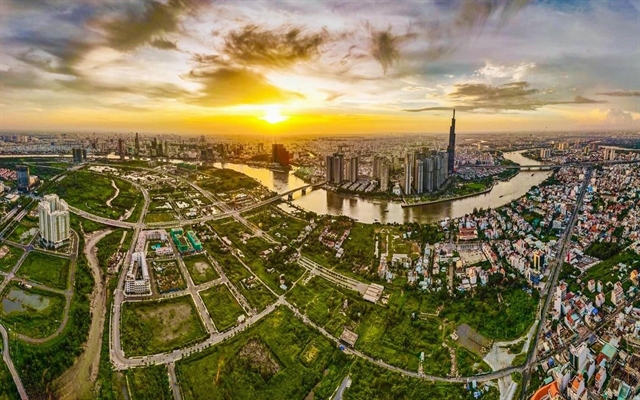 Economy
Economy


|
| A view of HCM City. Việt Nam's property market is evolving to meet new demands, with the data centre sector emerging as a hotspot. —Photo chinhphu.vn |
HÀ NỘI — Việt Nam’s real estate market is on the cusp of a boom in the second half of 2025, fueled by sweeping legal reforms, proactive economic diplomacy, and a pivot toward emerging segments and flexible partnership models, said Nguyễn Lê Dung, head of Investment, Savills Hanoi.
A suite of newly enacted laws, including the 2024 Land Law, the 2023 Law on Real Estate Business, decrees guiding their enforcement, and another on land use and lease fees, is dismantling long-standing regulatory barriers and laying the groundwork for a more transparent, stable, and investor-friendly legal environment that aligns with international standards.
"The reforms are particularly critical for high-end residential, urban development, industrial, and hospitality projects, which are drawing significant foreign interest," Dung said.
Việt Nam’s expanding network of Comprehensive Strategic Partnerships with major economies is further reinforcing its image as an attractive investment destination. Recent high-profile events hosted in Việt Nam, such as the Partnership for Green Growth and the Global Goals 2030 (P4G) Summit, the UNCTAD Ministerial Conference, and the ASEAN Future Forum 2025, have spotlighted the country’s growing geopolitical significance.
The market is evolving to meet new demands, with the data centre sector emerging as a hotspot, according to Savills. Global players like Nvidia, Gaw Capital, Viettel IDC, and CMC Telecom are ramping up investments, driven by Việt Nam’s role as a hub in regional supply chains.
“Investment decisions are no longer influenced solely by traditional economic metrics,” Dung noted. “They are now deeply intertwined with broader trends such as geopolitical shifts, supply chain restructuring, and global trade protectionism”.
Việt Nam’s neutral stance and balanced relations with powers like the US, China, Japan, and Europe have fueled demand for industrial parks, logistics infrastructure, and housing for expatriate professionals. However, FDI remains sensitive to macro-financial factors, such as exchange rate fluctuations and capital costs, which can impact profit repatriation. Domestic interest rates and credit policies also play a pivotal role in project viability and local demand.
Foreign investors are increasingly prioritising projects with clear legal frameworks, willing to pay premiums for transparency and faster capital deployment, according to Savills. Environmental, Social, and Governance (ESG) criteria are now a must for many, particularly European and North American funds, with projects incorporating green spaces, sustainable materials, and robust risk management gaining an edge.
A notable trend is the shift toward satellite regions. With land scarcity and soaring prices in HCM City and Hà Nội, investors are eyeing provinces like Hưng Yên, Bắc Ninh and Hải Phòng, which are benefiting from improved technical infrastructure and transport connectivity. — VNS




